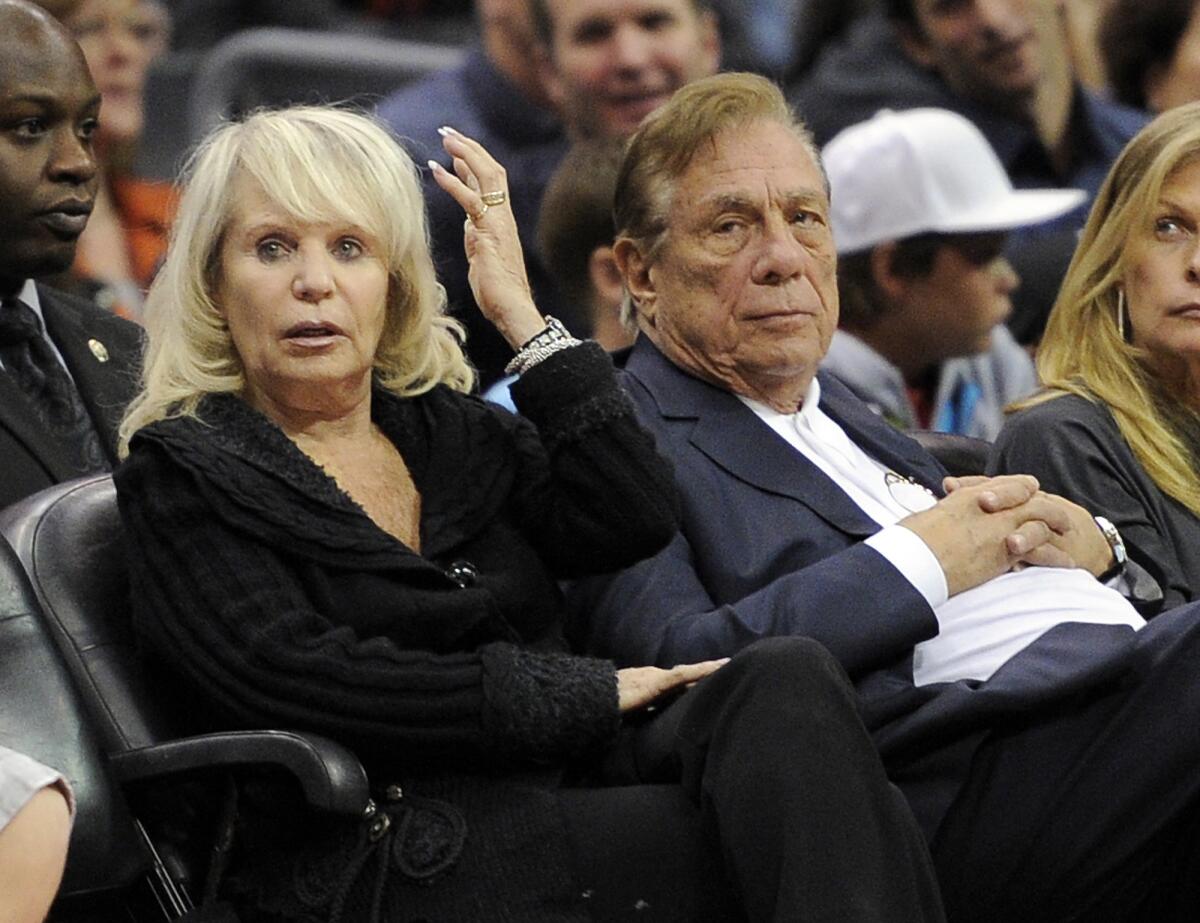Tension between Shelly and Donald Sterling plays out in court papers

- Share via
The much-anticipated courtroom showdown of Sterling vs. Sterling did not materialize Monday morning, as the couple fighting over ownership of the Clippers awaited a U.S. District Court decision over whether the federal courts would intervene in the dispute.
While the jurisdictional matter could take hours or days to resolve, the tensions between Donald and Shelly Sterling continued to flare in legal papers in which both argued that they had the best interests of their family at heart.
Donald Sterling said in his court papers that he gave an initial consent to his wife soliciting bids for the team only with the understanding that she would be able to maintain a stake of 20% or 30% in the team. Instead, Shelly agreed to sell 100% of the Clippers on May 29 to former Microsoft chief executive Steve Ballmer for a record $2 billion.
The sale was precipitated by racially charged remarks that Donald Sterling made to a companion that were captured on an audio recording — leading to a $2.5 million fine, lifetime ban from the NBA and a push by the NBA to force Donald to sell the team.
“Donald felt guilty that he had brought all this on his wife and she should not be punished and lose her 50% ownership in the NBA’s termination proceedings,” Sterling’s lawyers wrote in their brief in preparation for Monday’s probate trial.
“When Donald realized that Ballmer was going to be 100% owner of the Clippers and Shelly was not going to retain any ownership stake…. Donald did not agree to those terms of the sale that were not consistent with Shelly’s promise to him.”
Donald Sterling has argued in the downtown courtroom that his wife used fraud and undue influence to get him to undergo examinations by two experts who declared him medically incapacitated. He has also contended that, regardless of the findings by the doctors, that Shelly’s sale of the Clippers should not go through because he moved to disband, or “revoke,” the trust.
Before any of those issues could be heard in Judge Michael Levanas’ courtroom, however, Sterling filed papers in federal court in an attempt to move the case there. Sterling says the U.S. courts should take jurisdiction because his wife violated his privacy rights under federal law, as outlined in the Health Insurance Portability and Accountability Act.
Donald Sterling blamed his wife and the two doctors for the alleged privacy breach. “When Shelly decided to push Donald aside by any means necessary, her actions were in violation of her duties to Donald as her spouse and as her co-trustee,” his pretrial brief said.
Shelly Sterling’s lawyers called that argument “absurd.” They said that when Donald signed the family trust he should have been aware that the incapacity clause included a waiver of patient confidentiality. In signing the trust, they said, Donald acknowledged that he could be subjected to a mental competency test at any time.
Shelly’s lawyers say that she is the family member truly looking out for the best interests of the trust and the family, which includes two surviving adult children. They accused Donald of selfishly fighting the sale to Ballmer because he has said he wants to restore his dignity.
“The evidence will overwhelming show one trustee seeking to obtain an extraordinary benefit for the trust and its beneficiaries,” the trial brief declares “and the other trustee seeking to assuage his ego at the expense of the trust and his family.”
Shelly Sterling’s team also scoffed at the notion that she had an undue influence over her husband in arranging the psychiatric exams. “Donald is a far more aggressive, overbearing person than Shelly,” the legal papers say, “and she could hardly be called dominant in their relationship.”
Twitter: @LATimesrainey
More to Read
Go beyond the scoreboard
Get the latest on L.A.'s teams in the daily Sports Report newsletter.
You may occasionally receive promotional content from the Los Angeles Times.











